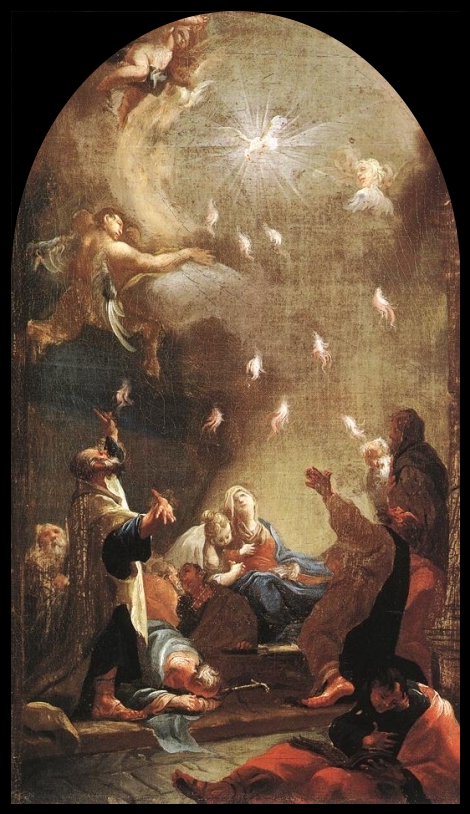
Pentecost Sunday
Nobel Prize-winning Polish poet Czeslaw Milosz uses the occasion of Pentecost to explore the nature of faith in his poem “Veni Creator.” Although the apostles may have been filled with the Holy Spirit, what about those of us who don’t experience tongues of flame?
Here’s Luke’s description of moment (Acts 2:1-4):
When the day of Pentecost had come, the disciples were all together in one place. And suddenly from heaven there came a sound like the rush of a violent wind, and it filled the entire house where they were sitting. Divided tongues, as of fire, appeared among them, and a tongue rested on each of them. All of them were filled with the Holy Spirit and began to speak in other languages, as the Spirit gave them ability.
Milosz imagines himself in various locales longing to experience divinity but failing. He himself could be the snow-covered, crippled fir in the Sierra Nevada that he mentions, asking for a tangible sign because the Holy Spirit for him has become nothing more than an abstraction.
In Milosz’s frustration, I think of Ivan Karamazov’s Grand Inquisitor, accusing Jesus of setting an impossible ideal for his followers:
Thy hope was, that following Thy example, man would remain true to his God, without needing any miracle to keep his faith alive! But Thou knewest not, it seems, that no sooner would man reject miracle than he would reject God likewise, for he seeketh less God than “a sign” from Him.
The passage is a response to Jesus’s consistent refusal to provide people signs, such as this one in John 6:30: “”What sign then will you give that we may see it and believe you? What will you do?”
As though confirming his accusation, Milosz tells us,
I am only a man: I need visible signs.
I tire easily, building the stairway of abstraction.
“We would have a sign,” the old man begs in “Gerontion,” and Milosz asks God whether he can’t have “the statue in church/lift[ ] its hand, only once, just once, for me.” If that happened, he wouldn’t be plagued by doubt.
He acknowledges, however, that the Holy Spirit must speak to us through “human signs,” not supernatural phenomena. The sign he looks for, then, is divinity within another human being. The presence of love would be a sign that the Holy Spirit has come:
Veni Creator
Come, Holy Spirit,
bending or not bending the grasses,
appearing or not above our heads in a tongue of flame,
at hay harvest or when they plough in the orchards or when snow
covers crippled firs in the Sierra Nevada.
I am only a man: I need visible signs.
I tire easily, building the stairway of abstraction.
Many a time I asked, you know it well, that the statue in church
lifts its hand, only once, just once, for me.
But I understand that signs must be human,
therefore call one man, anywhere on earth,
not me—after all I have some decency—
and allow me, when I look at him, to marvel at you.
To better understand the spiritual transcendence Milosz has in mind when he talks about looking at another, here’s his poem “Love”:
Love means to learn to look at yourself The way one looks at distant things For you are only one thing among many. And whoever sees that way heals his heart, Without knowing it, from various ills. A bird and a tree say to him: Friend. Then he wants to use himself and things So that they stand in the glow of ripeness. It doesn’t matter whether he knows what he serves: Who serves best doesn’t always understand.
Those tongues of flame are the glow of love in the world. That’s what Pentecost is all about.